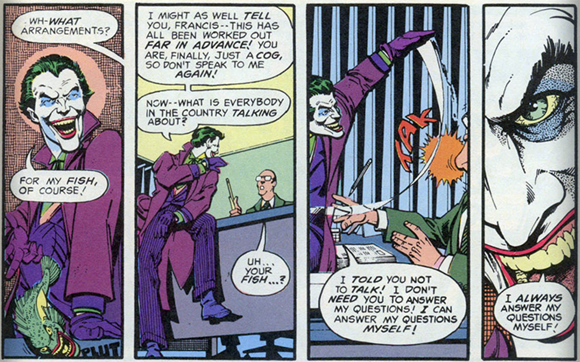joker in academia

And I thought the topics and issues I am belabouring are somewhat exotic, or even strange … If I’d have the time, I’d love to submit something. On the other hand, that last note: ‘Note that invitation to submit a full essay does not guarantee inclusion in the volume.’ Quite frankly, and this isn’t meant arrogantly, but I do not see myself fit to meet rules like that—it’s simply a matter of time, the scarcest resource.
Anyway, here’s the worthwhile call for abstracts (although I do not think that the Joker himself will like being dissected academically—see above. Panel taken from ↵Strange Apparitions):
The Joker: Critical Essays on the Clown Prince of Crime
Robert Moses Peaslee & Robert G. Weiner, Editors“Nobody panics when things are going according to plan, even if the plan is horrifying.”
—The Joker (Heath Ledger), The Dark Knight (2008)If one were to survey the global public about their favorite superheroes, the results would likely place Batman, Spider-Man, and perhapsSuperman in the top tier. If one were to ask about super villains, however,it’s unlikely that any character would receive more attention than the Joker. To date, the character has appeared in thousands of comics, numerous animated series, and three major blockbuster feature films dating back to 1966. One could make a strong argument that the Clown Prince of Crime is the most popular and well-known fictional villain in the history of popular culture. A superhero is only as interesting as the villains he or she faces, and the Joker stands out among hundreds of villains as one of the most complex, culturally resonant, and morally ambiguous characters to ever grace a comic book page or movie screen. In 2006, Industry publication Wizard ranked the Joker as the number one comic villain of all time.
Academic studies and collections of Batman abound, both as a text and as an industry (DiPaolo, 2009; Eury, 2009; Schopp, 2009; Kuwata, 2008; O’Neil, 2008; Zehr, 2008; Brooker, 2007; Morris, 2005; Pearson & Uricchio, 1991). Despite the Joker’s popularity, however, there has never appeared a serious scholarly monograph or edited collection based around the character. The editors hope to rectify this gap in the literature of sequential art, film, media, and cultural studies. Our aspiration is to compile the definitive volume on the character, encompassing historical, textual, institutional, and interpretational approaches from a wide variety of disciplines.
To this end, the editors seek abstracts of no more than 500 words outlining proposed essays of 6,000-8,000 words. Abstracts should makeclear the author’s approach to the material in epistemological terms and indicate whether or not the piece has appeared in previous forms elsewhere.Abstracts should show potential as rigorous primary research, theory development or criticism.
A by-no-means-exhaustive list of possible topics includes:* Historical-textual examinations of the Joker’s emergence and evolution
* Comparative analyses of the Joker’s various characterizations and adaptations
* Socio-cultural approaches to the Joker’s symbolic potential
* The Joker and gender, race, sexuality, ability, etc.
* Gaming environments and the Joker’s manifestations in ludic narratives
* The Joker as an entertainment marketing tool
* The Joker pre- and post-9/11
* Relationships between the Joker and other heroes and/or villains
* Author- or creator-driven analyses
* Theoretical approaches to the Joker’s visual composition
* Narrative and rhetorical criticism
* Archetypal explorations of Joker pre-cursors
* Psychological or psychoanalytical analyses
* Humor and/or clowning and their relationship to the sinister
* The para-cinema of the Joker
* Fan communities and performance
* The Joker as a stabilizing or confounding force in sequential art taxonomies
* Joker philosophy
* Art historical or visual culture-driven analyses of the Joker
* The Joker as a pedagogical tool
* Digital manifestations of the Joker and/or the Joker “ethos”Abstracts should be submitted no later than Dec. 15, 2011. Please send abstracts via email to rob[dot]weiner[at]ttu[dot]edu
Those authors whose abstracts are accepted will be notified no later than February 1, 2012. Full essays will be required by April 1, 2012 and will be reviewed by both the editors and guest reviewers.
Note that invitation to submit a full essay does not guarantee inclusion in the volume. Selected authors will be notified over the summer of 2012.Thanks,
RobRobert Moses Peaslee, Ph.D.
Assistant Professor, Dept of Electronic Media & Communication
College of Mass Communications
Texas Tech University

